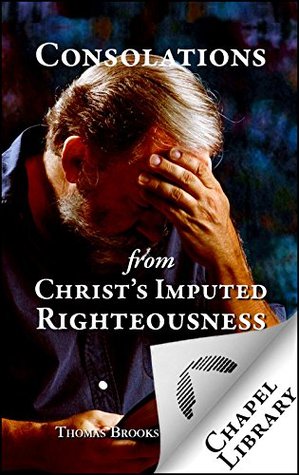- Bible
- Read the Bible
- Bible Versions
- Verse of the Day
- Reading Plans
- Verses by Topic
- Books of the Bible
- Bible Images
- Study
- Commentaries
- Concordances
- Dictionaries
- Encyclopedias
- Sermons
- Bible Atlas & Maps
- BP Wiki
- Devotionals
- Today's Devotionals
- Light of the World
- All Devotionals
- Inspirational Quotes
- More
- Picture Quotes
- Videos
- Inspirational
- Bible Study
- What The Bible Says
- Bible Q&As
- Daily Bread
- Bible by Genre
- Bible Stories
- Random Bible Verse
- Community
- Store
Consolations from Christ's Imputed Righteousness
by Thomas Brooks
Another quality eBook from Chapel Library. Consolations from Christ’s Imputed Righteousness wonderfully combines devotional encouragement and doctrinal truth. It faithfully declares the heart of the Gospel for both Christians and non-Christians alike.
Thomas Brooks (1608-1680) was born into a Puritan family and became a Nonconformist preacher. He studied at Cambridge, became an advocate of the Congregational way, and served as a chaplain in the English Civil War. In 1648 he accepted the rectory of St. Margaret’s in London and on several occasions preached before Parliament. Like many others, Brooks was ejected by the Act of Uniformity in 1662, and remained in London as a Nonconformist preacher. He labored in comfort and relief during the Great Plague and Great Fire, and in 1672 was granted a license to preach in Lime Street. Brooks wrote over a dozen books, which include Precious Remedies against Satan’s Devices and The Mute Christian under the Smarting Rod. His writings are always Christ-centered, filled with Scripture, and usually devotional in character. Charles Spurgeon once told his students, “His style is clear and full; he never so exceeds in illustration as to lose sight of his doctrine. His floods of metaphor never drown his meaning, but float it upon their surface. If you have never read his works I almost envy you the joy of entering for the first time.”
Thomas Brooks (1608-1680) was born into a Puritan family and became a Nonconformist preacher. He studied at Cambridge, became an advocate of the Congregational way, and served as a chaplain in the English Civil War. In 1648 he accepted the rectory of St. Margaret’s in London and on several occasions preached before Parliament. Like many others, Brooks was ejected by the Act of Uniformity in 1662, and remained in London as a Nonconformist preacher. He labored in comfort and relief during the Great Plague and Great Fire, and in 1672 was granted a license to preach in Lime Street. Brooks wrote over a dozen books, which include Precious Remedies against Satan’s Devices and The Mute Christian under the Smarting Rod. His writings are always Christ-centered, filled with Scripture, and usually devotional in character. Charles Spurgeon once told his students, “His style is clear and full; he never so exceeds in illustration as to lose sight of his doctrine. His floods of metaphor never drown his meaning, but float it upon their surface. If you have never read his works I almost envy you the joy of entering for the first time.”
BUY NOW
Kindle Edition, 90 pages
Published July 6th 2015 by Chapel Library
© 2026 Bibleportal.com All rights reserved.

Thomas Brooks (1608 - 1680)
Much of what is known about Thomas Brooks has been ascertained from his writings. Born, likely to well-to-do parents, in 1608, Brooks entered Emmanuel College, Cambridge in 1625, where he was preceded by such men as Thomas Hooker, John Cotton, and Thomas Shepard. He was licensed as a preacher of the Gospel by 1640. Before that date, he appears to have spent a number of years at sea, probably as a chaplain with the fleet.After the conclusion of the First English Civil War, Thomas Brooks became minister at Thomas Apostle's, London, and was sufficiently renowned to be chosen as preacher before the House of Commons on December 26, 1648. His sermon was afterwards published under the title, 'God's Delight in the Progress of the Upright', the text being Psalm 44:18: 'Our heart is not turned back, neither have our steps declined from Thy way'. Three or four years afterwards, he transferred to St. Margaret's, Fish-street Hill, London. In 1662, he fell victim to the notorious Act of Uniformity, but he appears to have remained in his parish and to have preached as opportunity arose. Treatises continued to flow from his pen.[3]
Thomas Brooks was a nonconformist preacher. Born into a Puritan family, he was sent to Emmanuel College, Cambridge. He soon became an advocate of the Congregational way and served as a chaplain in the Civil War. In 1648 he accepted the rectory of St. Margaret's, New Fish Street, London, but only after making his Congregational principles clear to the vestry.
On several occasions he preached before Parliament. He was ejected in 1660 and remained in London as a Nonconformist preacher. Government spies reported that he preached at Tower Wharf and in Moorfields. During the Great Plague and Great Fire he worked in London, and in 1672 was granted a license to preach in Lime Street. He wrote over a dozen books, most of which are devotional in character. He was buried in Bunhill Fields.
... Show more